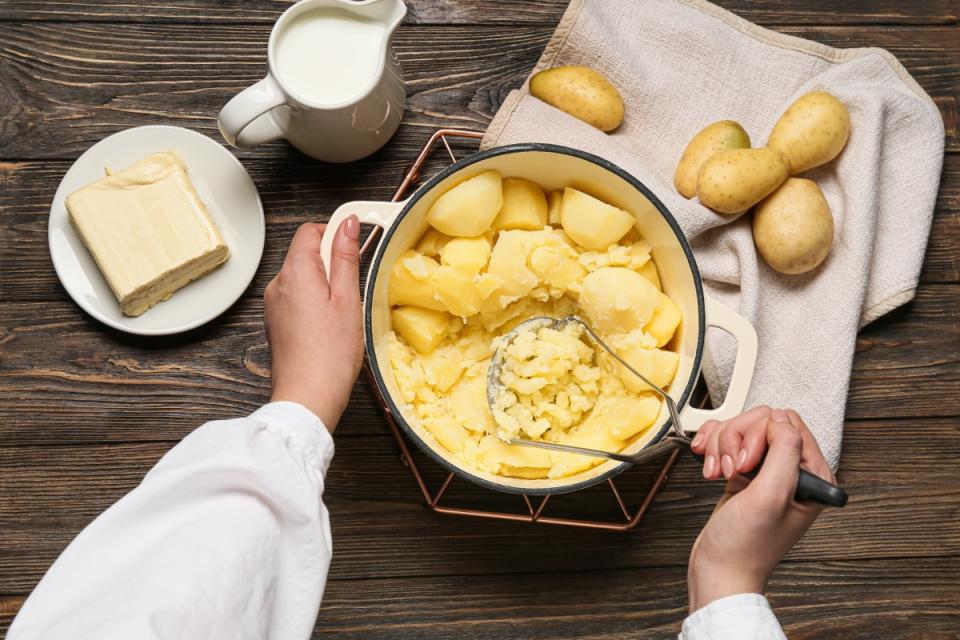Potatoes are probably one of the more versatile veggies: They're a welcome addition to any meal, and with so many different ways to prepare them, they don't really ever get old. But a new study has found that the way you cook your potatoes might matter more than you think. As it turns out, a few different cooking methods can actually spike your risk of developing diabetes, while other methods have a much more muted effect, if any. Read on to learn which potato preparations you may want to skip.
READ THIS NEXT: The Surprising Reason Leaving the Lights on at Night Spikes Your Diabetes Risk.
A recent study singled out potatoes.

Diabetes is becoming increasingly prevalent. In 2021, the condition affected 537 million people between the age of 20 and 79, according to a study recently published in the journal Diabetes Care on Oct. 28. By 2030, that number is anticipated to reach 643 million.
Researchers say this rise may be related to an increase in the consumption of processed foods and a decrease in fruit and vegetable intake. With that in mind, studies are being conducted to evaluate vegetables' effect on type 2 diabetes (T2D), but results have been someone inconsistent. Higher vegetable intake has been found to be associated with a lower risk of diabetes in some studies, while others found that eating more veggies had no real effect.
In the latest study, researchers isolated potatoes from other vegetables, discovering that taters actually "mask the association" between vegetable intake and T2D. Veggies do have benefits when it comes to T2D, researchers concluded, as those who consumed more vegetables (but no potatoes) had a 21 percent lower risk of developing the condition.
Armed with this knowledge, they then took a closer look at the relationship between potatoes and diabetes risk, specifically how these tubers are prepared.
Potatoes aren't all bad, but three cooking methods will spike your diabetes risk.

If you love your spuds, rest assured that plain old potatoes aren't likely to raise your diabetes risk.
Researchers evaluated data from 54,793 participants in the Danish Diet Cancer and Health study, of which 7,695 people went on to develop T2D over 16.3 years. The study found that diabetes risk increased when participants ate potatoes in three key variations—fried, mashed, and potato chips. Boiled potatoes, on the other hand, didn't increase or decrease risk.
While this may not sound all that surprising, the key aspect of the study is that in general, potatoes aren't going to increase diabetes risk, Juliana Tamayo, registered dietitian and editor for FitnessClone.com, explains. "What makes diabetes worse or increases the risk for diabetes is the way potatoes are prepared and the ingredients they are paired with," she tells Best Life.
Tamayo points out that how you cook potatoes affects their nutrient content, and that boiled potatoes don't have added ingredients that change their makeup.
"Mashed potatoes, fried potatoes, and potato chips all contain added fat [and] salt," Tamayo says, noting that accompanying condiments are generally high in sugar and fat. "Mashed potatoes are often prepared with whole milk or heavy cream, butter, and salt, all of which can increase the risk for high cholesterol, high blood pressure, and exacerbate diabetes. Fried potatoes and potato chips are usually made in vegetable or peanut oil, which is higher in saturated fat."
For more health news sent directly to your inbox, sign up for our daily newsletter.
Researchers also took other dietary tendencies into account.

Unlike previous studies, researchers also accounted for the typical diet of people who eat large amounts of potatoes. This includes red meat, which is a known risk factor for T2D and could affect the likelihood of developing diabetes, lead study author Nicola Bondonno, PhD, a post-doctoral research fellow at Edith Cowan University in Perth, Australia, explained to Medical News Today.
But it's not just overall diet—it does come out to the potatoes. Fries and chips are starchy and higher in carbohydrates. "These types of foods make your body produce more insulin to control blood sugars, and if eaten in higher quantities, may cause you to gain weight in the abdomen, which can cause insulin resistance, which can lead to type 2 diabetes," Jason Ng, MD, clinical associate professor of medicine, and chairperson of the Diabetes Task Force at the University of Pittsburgh, told the outlet.
Comparatively, vegetables are high in vitamins and low in calories, Bondonno said. While it's unclear exactly why eating vegetables lowers T2D risk, it could be tied to lower resultant body mass index (BMI) and weight, Medical News Today reported.
It's all about balance.

Researchers did find that, when compared with those who ate the least amount of potatoes (excluding fries and chips), those with the highest intake had a 9 percent increased risk of diabetes. But don't let that get you down, as medical professionals confirm potatoes can have a place in a healthy, balanced diet.
Tamayo recommends preparing potatoes in olive oil without added salt. You can also help leave their nutritional value intact by baking, grilling, sautéing, or boiling, she says, adding that you should also consider what you serve alongside your spuds.
"Try pairing your potatoes with a lean protein, like poultry or fish, and fiber, such as a salad or vegetables," she says. "Eating carbohydrates paired with protein will slow down their absorption, ultimately leading to more controlled blood sugar levels."
"vegetable" - Google News
January 04, 2023 at 08:04PM
https://ift.tt/L5pod74
Cooking Potatoes These 3 Ways Spikes Your Diabetes Risk, New Study Finds - Yahoo Life
"vegetable" - Google News
https://ift.tt/A0ktFNu
https://ift.tt/L5noNfC
Bagikan Berita Ini














0 Response to "Cooking Potatoes These 3 Ways Spikes Your Diabetes Risk, New Study Finds - Yahoo Life"
Post a Comment